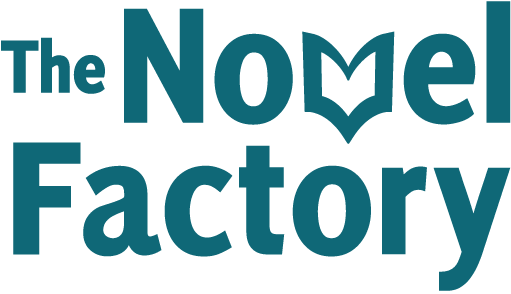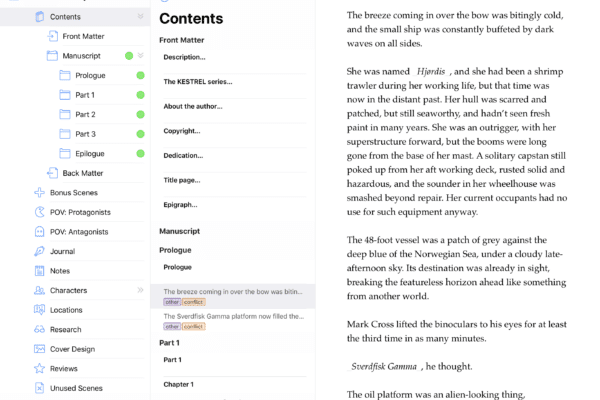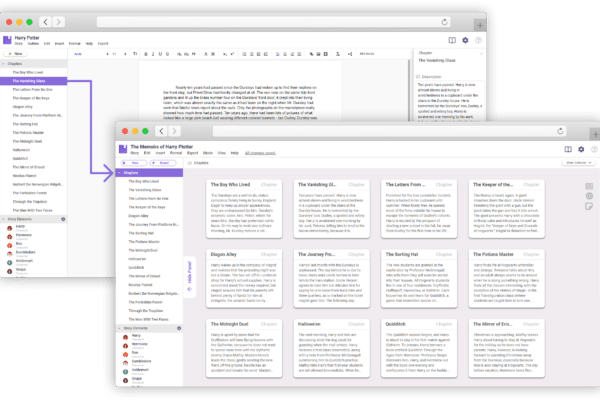
7 Scrivener Alternatives That Might Be Better For You
Lots of writers love Scrivener.
And for good reason.
It’s a robust writing software that helps you organize, write, and format your book.
But many writers assume it’s the best writing software for them and forgo researching their other options.
This is a mistake—one I’m very glad you aren’t making.
Because, as you’ll see in a minute, Scrivener has some major drawbacks and it’s highly likely that it isn’t the best option for your goals.
Below, we reveal my top 7 Scrivener alternatives and give you a deep dive into their pros & cons so you can make the most informed decision possible.
Less time researching software means more time writing!
Novel Factory simplifies the novel-writing process. Click here to get a FREE 30-day trial.
7 Scrivener Alternatives to Check Out Before You Buy
1. Novel Factory
Pricing:
- Basic – $7.50/month or $75/year (two months free)
- Standard – $20/month or $198/year (two months free)
- Premium – $60/month or $600/year (two months free)
Who It’s Best For:
Novel Factory is perfect for novelists who need help organizing their thoughts and ideas. It’s great for writers who want structured character and plot development tools, and proven story templates to guide them from the first draft to the final manuscript.
Pros:
- Designed and created by an award-winning writer with a major six-figure deal with Penguin Random House
- Great for organizing your thoughts and ideas
- Specifically designed for novelists (with tools for character + plot development)
- Proven story templates built right into the software
- Offers a free trial (without requiring a credit card on file)
- Proven writing advice directly in the software
- Progressive web app that works on Mac and Windows
Cons:
- Might not be as helpful if you’re not writing a novel
- Subscription-based rather than a one-time fee

Novel Factory is a lot like Scrivener but it’s designed specifically for writing fiction.
It has the same kinds of robust features that Scrivener has, but without the steep learning curve and additional tools that make writing a novel much easier.
In addition to common features like outlines, corkboards, and organization, Novel Factory also has proprietary tools like:
- The easy-to-use roadmap feature: a step-by-step guide to writing a novel from the first draft to final manuscript
- A full-fledged character development section to help you develop your characters, as well as space to outline their characteristics such as motivation, archetype, and physical description.
- A plot planner that will assist you in planning out your story and includes numerous useful templates for popular narrative types.
- A simple note board that organizes and keeps your ideas within reach
- A locations tab that enables you to describe and keep track of all your story’s settings
- A planning section that encourages you to use the five essential story components in building your tale’s concept, as well as other material.
We created Novel Factory for two reasons:
- To assist new writers in getting from concept to first draft
- To empower expert writers to write better and more efficiently
And our software has helped countless novelists in both situations.
Want to try it out?
Click here to sign up for a FREE 30-day trial (no credit card required) <<<
2. Ulysses

Pricing:
$5.99/month or $39.99/year
Who It’s Best For:
Ulysses is ideal for writers using Apple devices who need a versatile tool for various writing projects. It’s best for those who want an easy-to-use interface and don’t need specialized book-writing features.
Pros:
- Easy to use and navigate
- Can be used for any sort of writing project
- Reduced pricing for students
- Syncs with all of your Apple devices
Cons:
- Not available for Windows
- No unique features that help with writing books or novels
Ulysses is basically a mesh between Scrivener and Evernote for Apple products (Mac, iPhone, iPad).
It’s a versatile writing software that can be utilized by pretty much any type of writer—whether you’re writing novels, books, essays, articles, or website copy. The interface is very similar to Evernote but has organization features similar to Scrivener.
Like Scrivener, Ulysses helps you organize your writing projects so you can see all your research, notes, outlines, and more all in one place. Their website boasts that no projects are too big or too ambitious for Ulysses to handle.
But it also has some unique features Scrivener doesn’t have, like a built-in proofreader and editing assistant (you have to use 3rd party apps to get this with Scrivener).
There are two main downsides of Ulysses.
- It’s not available on Windows devices (if you don’t have an Apple device you’re out of luck).
- It’s a jack-of-all-trades and a master of none.
#2 is one of the biggest drawbacks of Ulysses.
Since it’s versatile, it doesn’t have many features specifically designed to help with ONE thing.
That means there are several other tools (including Scrivener) that are better than Ulysses if you want to write a book or novel.
For instance, it doesn’t have any specific tools for storing research, building characters, mapping your plot, and more.
But that might not be bad in your situation if you aren’t writing books or novels.
3. LivingWriter

Pricing:
Best Value…$12/month
Regular Payments…$14.99/month
No Commitment…$0 – 14 days trial
Lifetime…$699
Who It’s Best For:
LivingWriter suits writers looking for a cloud-based tool that’s easy to navigate. It’s perfect for those who want to collaborate with others and appreciate built-in story templates but don’t require advanced customization features.
Pros:
- Easy to use and navigate
- Great for team collaboration
- Offers a free trial (no credit card required)
Cons:
- Not as feature-rich as Scrivener or some of the other options on this list

LivingWriter is very similar to Scrivener. Its interface looks nearly identical and it has most of the same features (writing goals, board, etc).
What’s different?
Other than the pricing model (subscription vs one-time), LivingWriter offers:
- Built-in story templates
- Smart text and auto-suggest
- Syncing across any device (cloud base)
#3 is arguably their most unique feature.
Many other pieces of writing software aren’t cloud-based, and if they are, they’re either specifically for Mac or don’t have a mobile app.
Novel Factory is now a progressive web app that works on any platform, so that’s not the case for us. 🙂
LivingWriter also has a much easier-to-navigate interface than Scrivener. There isn’t a ridiculous learning curve to get started and you can even import your documents from Word and Scrivener easily.
The main downside of LivingWriter is its lack of robust tools.
Their significantly better user interface seems to come at the expense, to some degree, of the usefulness of their tools. The tools are definitely helpful, don’t misunderstand, but they aren’t nearly as customizable as Scrivener.
They also don’t have comprehensive fiction writing tools. They mainly only have story templates and different ways to organize your character info (via “story elements”).
There aren’t any generators or built-in novel-writing advice. This can be problematic if you’re writing a novel but isn’t a big deal if you’re writing nonfiction (or something else).
4. Novlr
Pricing:
Starter – Free
Plus – $5/month or $4/month billed annually at $48/year
Pro – $18/month or $14/month billed annually at $168/year
Who It’s Best For:
Novlr is excellent for writers who prefer a simple, clean interface and need basic features to organize their work. It’s ideal for those who want a reliable grammar checker and free writing courses without needing complex plotting and formatting tools.
Pros:
- Can be used on any device
- Grammar checker
- Free writing courses
- Free trial (no credit card required)
Cons:
- Only has very basic features
- No collaborative editing
- Lacks exporting and formatting tools
Novlr is very similar to Google Docs. It’s a cloud-based word processor that automatically backs up your work.
It’s a lot more detailed than Google Docs, of course, but it honestly doesn’t have many features.
It has common features like focus mode, goal tracking, chapter organization, and more, but it lacks many of the more advanced outlining and plotting resources that come with Scrivener and other tools on this list.
And the tools they do have specifically for writing fiction are among the most basic in the industry.
That being said, they do have a very helpful grammar checker (which is something Scrivener lacks).
One of the other main weaknesses is the price point.
It’s among the higher end of writing software at $100/year.
And depending on what kind of features you’re looking for, this could be a high price to pay for software without robust plotting and organizing tools.
But what they lack in features they make up for with simplicity.
Novlr has a very easy-to-use interface that you can pick up and use immediately. It also has one of the cleanest designs on the market.
So, if you’re looking for a super clean and simple piece of writing software, Novlr could be an interesting option to explore.
5. Fictionary

Pricing:
Fictionary StoryTeller – $19/month with Story Structure Software
Fictionary StoryTeller Premium – $39/month with Story Structure Software + Fictionary Live
Fictionary StoryCoach – $49/month, For Professional Editors With Clients
Who It’s Best For:
Fictionary is best for writers who have a completed manuscript and want to improve it through detailed analysis. It’s perfect for those who need help identifying weak areas in their story structure but don’t require extensive character and plot development tools.
Pros:
- Get an overarching view of your story arc
- Offers a free trial
- Analytical capabilities
- Attractive interface
Cons:
- Data is only as good as what you enter
- Most expensive option
- Not many tools for plot or character development
Fictionary is a Scrivener alternative for fiction writers that approaches the writing process from a different point of view.
Instead of starting with an idea and helping the writer grow it into a full novel, Fictionary has a stronger focus on improving your manuscript after you’ve written it.
So, it’s best for writers who’ve already written their manuscripts and want to find ways to make them even better.
This is because of its advanced and unmatched analytical capabilities. It can help you identify tangible things such as chapters or scenes that are too long or contain too many characters.
But these analytics are only as good as the information you provide Fictionary.
It doesn’t have the full context to be able to identify what the potential issues actually are. The tool simply analyzes your manuscript. It doesn’t know your goals or vision for your story.
Outside of the analytics, though, Fictionary doesn’t really stand out from the rest of the software on this list.
You can use it to create new novels from scratch, but its focus on analytics seems to have taken away the ability to create other helpful features for actually writing from scratch.
It’s also the most expensive software on this list.
But it’s very useful if you’ve already written a manuscript and you want to analyze it to find out where the inconsistencies or weak areas are.
6. Atticus
Pricing:
$147
Who It’s Best For:
Atticus is ideal for writers who need top-notch formatting and publishing tools. It’s perfect for those looking to export their manuscripts in multiple formats without needing features for research and plotting.
Pros:
- Great tools for formatting and publishing your manuscript
- Easy-to-use interface
- Cross-platform options
- One-time fee
Cons:
- No features for research, plotting, or character development
- No free trial
Atticus is a formatting software that allows you to easily select between several styles and export your novel in formats accepted by all major self-publishing platforms. It works in a browser, and you can also download apps for Windows and Mac, making it one of the most cross-platform options out there.
You can write your book on the platform, but there aren’t great tools for organizing, plotting, and more.
But that’s ok because it’s made to be the best-in-class software when it comes to formatting and exporting manuscripts.
And it does that VERY well.
Authors can still use Atticus to write their books if they’re looking to write their books and don’t need all the bells and whistles.
7. YWriter
Pricing:
Free
Who It’s Best For:
YWriter is perfect for budget-conscious writers who need a powerful, free tool to start their writing journey. It’s great for those who can handle a steeper learning curve and want to link and cross-reference their writing elements easily.
Pros:
- One of the only FREE apps
- Easily link everything together so you can cross-reference it
Cons:
- Can be difficult to use and navigate
- Primitive technology
YWriter is a FREE Scrivener alternative that can be used to write books of any kind. It’s a veteran piece of writing software that’s widely respected and loved.
YWriter has all the features you’d expect from a writing software, including places to keep track of characters, locations, scenes, chapters, and a place to write your novel.
Other than it being free, its big strength is that it allows you to link everything together and handily cross-reference, and it has lots of tools to keep track of your word counts and progress.
The main weakness of yWriter is that it’s not clear where to start when you first open it.
Surprisingly, the word processor takes a while to find.
There are also some sections of the interface that are primitive. They require you to enter code syntax instead of offering an interface where you can drag and drop things.
Additionally, characters, locations, and items aren’t displayed in the main interface for quick reference, which can be a major inconvenience.
But if you have a very limited budget, YWriter can be a great tool to start with. It packs a lot of power for free software.
Other Great Writing Software That Isn’t a Direct Scrivener Alternative
While the above tools are direct alternatives to Scrivener, there are other fantastic writing software options that can enhance your writing experience in different ways.
Here are a few:
1. ProWritingAid
ProWritingAid is an excellent tool for writers who want to improve their writing style and grammar through detailed reports and suggestions.
2. Grammarly
Grammarly is perfect for writers seeking an easy-to-use grammar and spelling checker that offers real-time corrections and writing enhancements.
3. Final Draft
Final Draft is the go-to software for screenwriters who need industry-standard formatting and comprehensive tools for scriptwriting.
These tools, while not necessarily direct competitors to Scrivener, provide invaluable support for various aspects of the writing process.
Writing a Novel?
As novelists, we, too, had issues with common writing software like Scrivener.
And that’s what led us to create Novel Factory.
This tool (now in its 3rd version) is everything we wish we had when we first started out as novelists. It has comprehensive and unmatched tools for creating and developing characters, building worlds, and writing using proven story templates.
And if you’re writing a novel, you can try it FREE for 30 days (no credit card required).







